Arts & Entertainment
Five decades of progress since Stonewall
20 events that shaped the LGBTQ movement
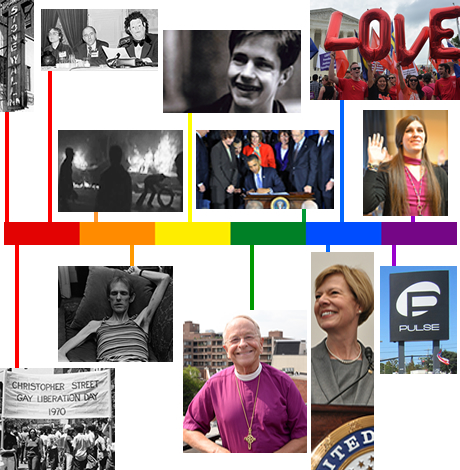
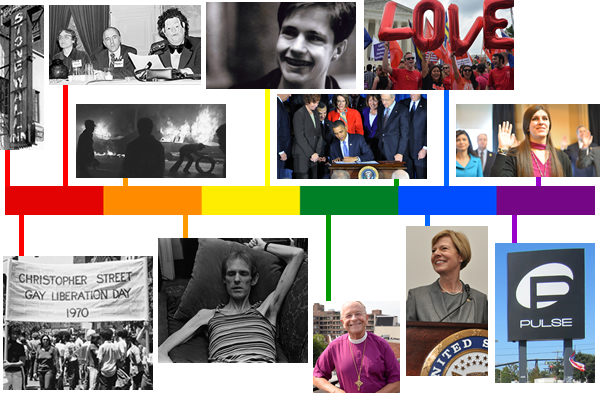
This month marks the 50th anniversary of the Stonewall riots, which are credited with launching the modern LGBTQ rights movement. Since that time, the country has seen tremendous progress in LGBTQ equality and acceptance. Here is a list of 20 events that have shaped the LGBT rights movement over the last 50 years.
June 28, 1970:
Upwards of 2,000 people took part in New York’s Christopher Street Liberation Day that commemorated the first anniversary of the Stonewall riots. This march is seen by many as one of the first Pride events.
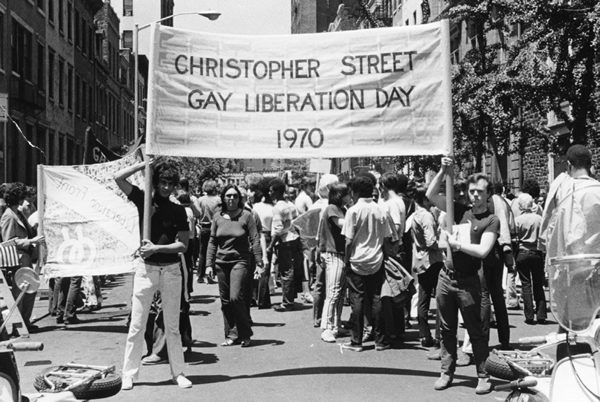
Dec. 15, 1973:
The American Psychological Association declassified homosexuality as a mental illness.

June 8, 1977:
Voters in Dade County, Fla., repealed a gay rights ordinance the Dade County Commission approved earlier in the year.
Anita Bryant’s campaign against the ordinance ahead of the referendum prompted outrage among LGBT activists across the country and a boycott of Florida orange juice. The Miami-Dade County Commission in 1998 approved a ban on discrimination based on sexual orientation.
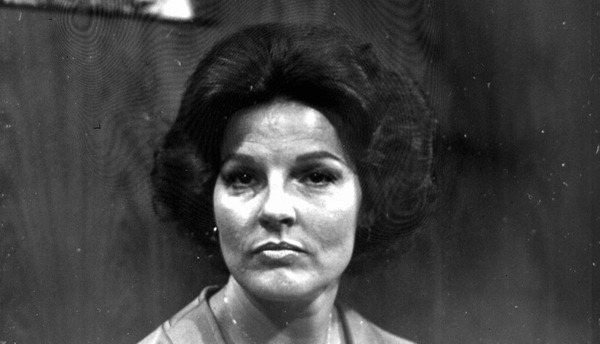
Nov. 27, 1978:
San Francisco Supervisor Dan White assassinated City Supervisor Harvey Milk and Mayor George Moscone inside San Francisco City Hall.
The assassination of Milk, a pioneering activist who was the first openly gay man elected in California, sparked an outpouring of grief that included a candlelight vigil in which up to 40,000 people participated. White’s sentence for voluntary manslaughter in connection with Milk’s murder sparked what became known as the White Night riots that took place in San Francisco in May 1979.

Oct. 14, 1979:
The National March on Washington for Lesbian and Gay Rights took place in D.C. The gathering was the first of several large LGBT rights marches that have taken place since the Stonewall riots.
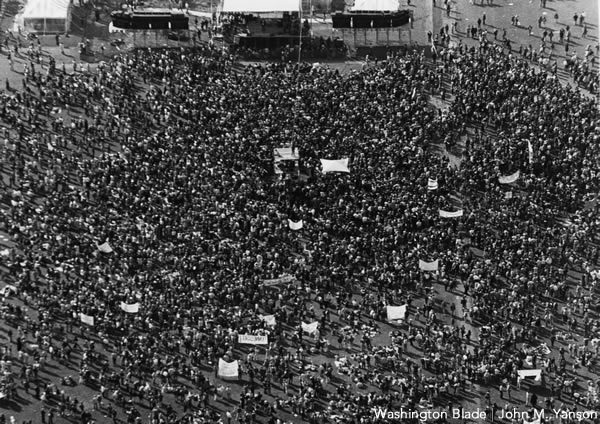
July 3, 1981:
The New York Times published an article on a “rare and often rapidly fatal form of cancer” that later become known as AIDS.
The AIDS epidemic has killed more than an estimated 600,000 people in the U.S. It also sparked activism that persists to this day, even though medications and access to treatment have allowed many people with HIV/AIDS to live longer lives.
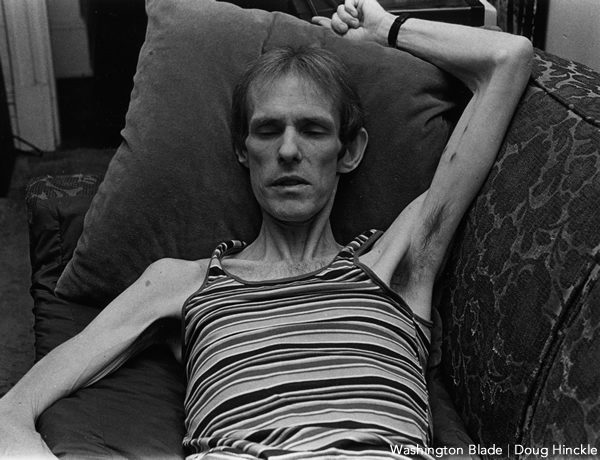
June 30, 1986:
The U.S. Supreme Court in a 5-4 ruling in Bowers v. Hardwick ruled the Constitution does not protect consensual same-sex sexual activity. The decision upheld a Georgia law that criminalized oral and anal sex among consenting adults.
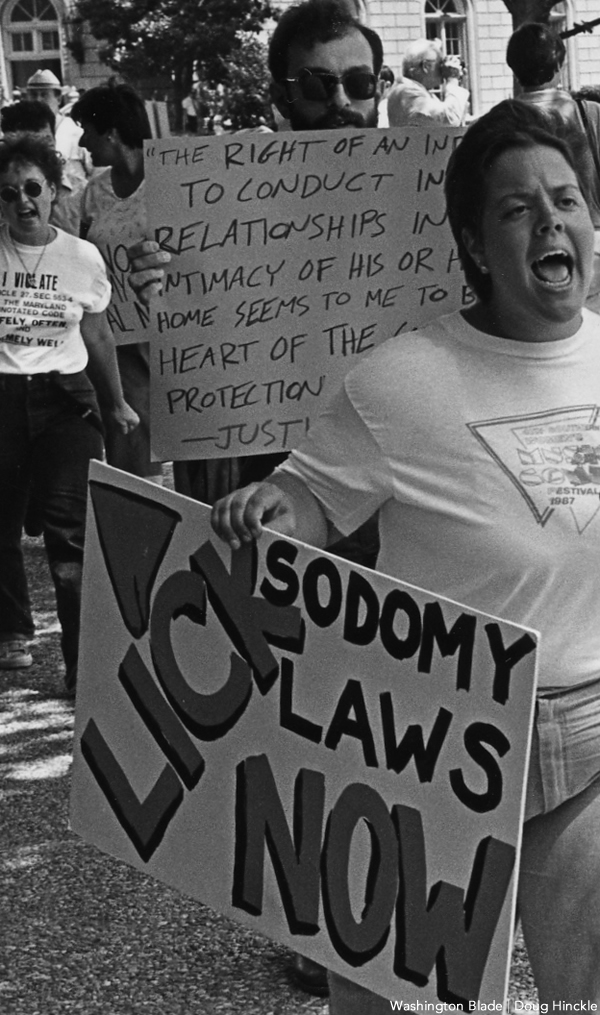
Sept. 20, 1996:
President Clinton signed the Defense of Marriage Act, which prevented the federal government from recognizing the marriages of same-sex couples that were legally performed.
Edith “Edie” Windsor challenged DOMA after she paid $363,000 in federal estate taxes when her wife passed away in 2009. The U.S. Supreme Court in 2013 found DOMA unconstitutional.
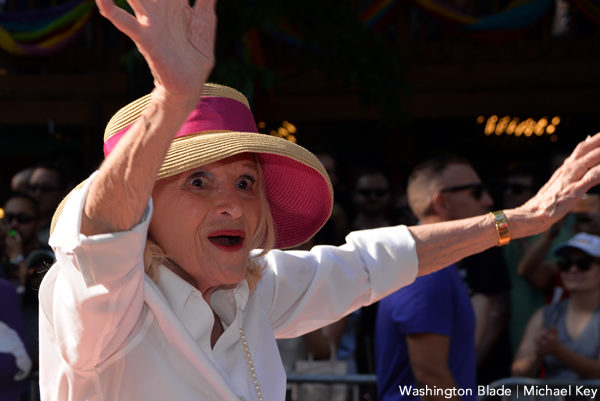
Oct. 12, 1998:
Matthew Shepard, a gay Wyoming college student, died after two men brutally beat him and left him tied to a fence.
Shepard’s death sparked outrage across the country. It also prompted his parents, Dennis and Judy Shepard, to become vocal LGBT activists through their work with the Matthew Shepard Foundation they created after their son’s murder.
President Obama in 2009 signed the Matthew Shepard and James Byrd Jr. Hate Crimes Prevention Act, which added sexual orientation and gender identity to the federal hate crimes law.
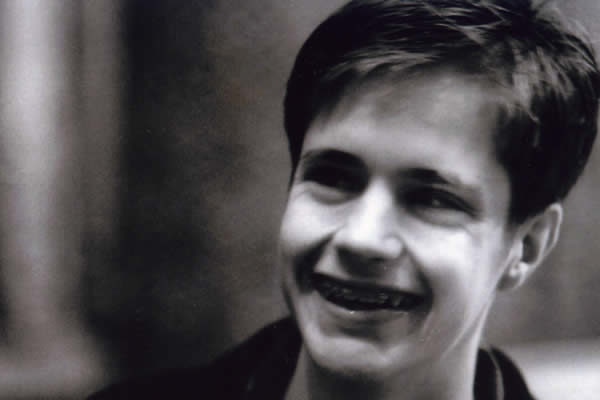
June 29, 1999:
James Hormel became the first openly gay U.S. ambassador.
President Clinton named Hormel to represent the U.S. in Luxembourg. More than half a dozen other openly gay men have been named ambassadors since 1999. These include current U.S. Ambassador to Germany Richard Grenell.
June 26, 2003:
The U.S. Supreme Court in a 6-3 ruling in Lawrence v. Texas ruled sodomy laws are unconstitutional.
Nov. 2, 2003:
New Hampshire Bishop V. Gene Robinson became the first openly gay bishop ordained by the Episcopal Church.
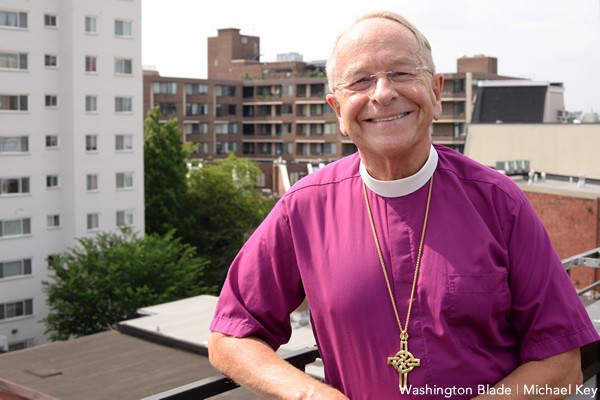
May 17, 2004:
Massachusetts became the first state in the U.S. to allow same-sex couples to legally marry.
Feb. 1, 2009:
Jóhanna Sigurðardóttir became the world’s first openly LGBT head of government when she was sworn in as Iceland’s prime minister.
Sigurðardóttir left office in 2013.
Irish Prime Minister Leo Varadkar and Luxembourgish Prime Minister Xavier Bettel are openly gay, while Serbian Prime Minister Ana Brnabić is a lesbian. Elio Di Rupo, who was Belgium’s prime minister from 2011-2014, is also openly gay.
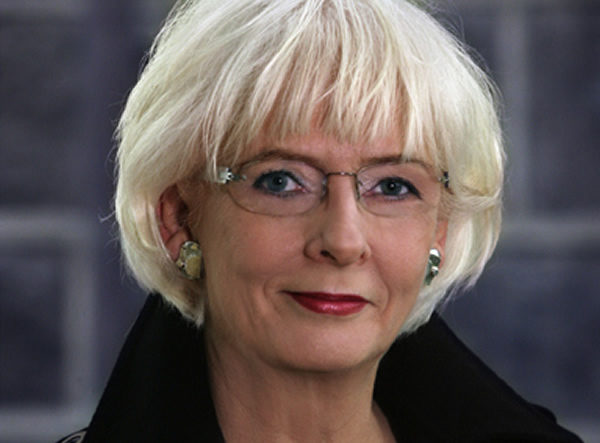
Sept. 20, 2011:
“Don’t Ask, Don’t Tell,” the law that prohibited openly gay people from serving in the U.S. military, was officially repealed.
“As of today, patriotic Americans in uniform will no longer have to lie about who they are in order to serve the country they love,” said then-President Obama. “As of today, our armed forces will no longer lose the extraordinary skills and combat experience of so many gay and lesbian service members.”
The Pentagon in 2016 announced it would no longer prohibit openly transgender people from the military. The Trump administration has reinstituted this ban.
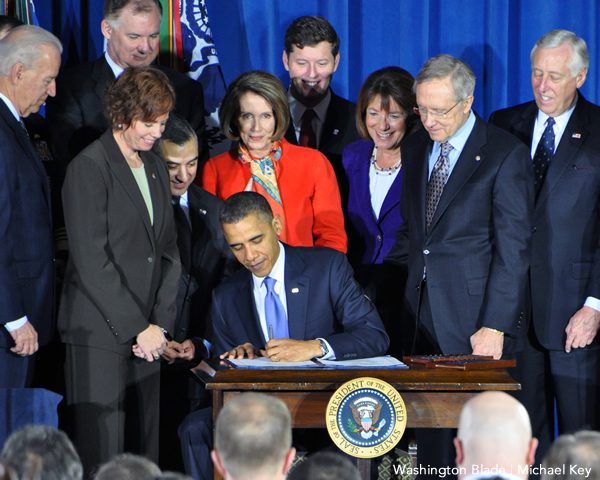
Nov. 6, 2012:
Tammy Baldwin became the first openly LGBT person elected to the U.S. Senate.
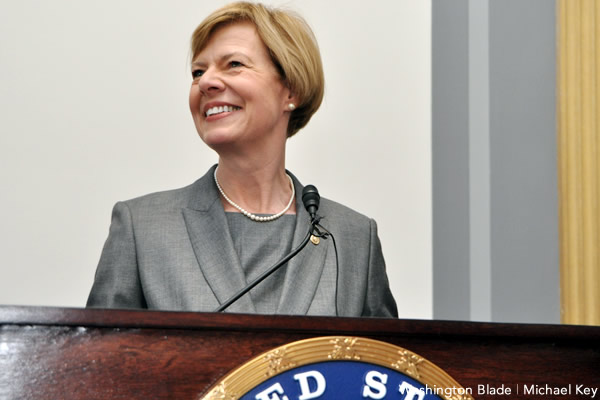
June 26, 2015:
The U.S. Supreme Court in a 5-4 ruling in Obergefell v. Hodges extended marriage rights to same-sex couples across the country.
James Obergefell, who was the lead plaintiff in the case, legally married his late-husband, John Arthur, on the tarmac of Baltimore-Washington International Thurgood Marshall Airport in 2013 after the Supreme Court struck down DOMA. The couple’s home state of Ohio did not legally recognize their wedding.
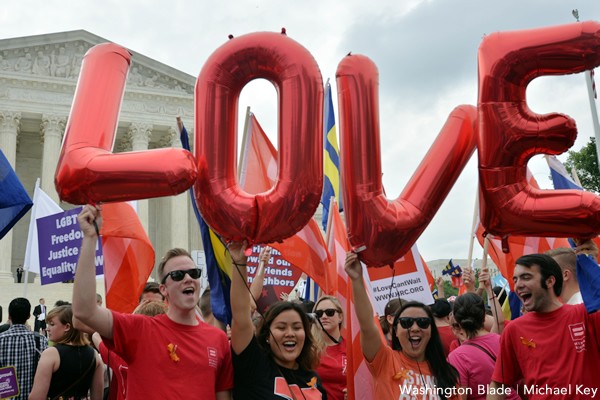
June 12, 2016:
A gunman killed 49 people inside Pulse, a gay nightclub in Orlando, Fla.
The massacre was the deadliest mass shooting in modern U.S. history until a gunman killed 58 people and injured more than 500 others at a Las Vegas concert on Oct. 1, 2017.
The Pulse nightclub massacre sparked renewed calls for gun control from LGBT rights advocates and their supporters. It also prompted President Trump, who was running for president, to renew his calls to temporarily ban Muslims from entering the U.S.
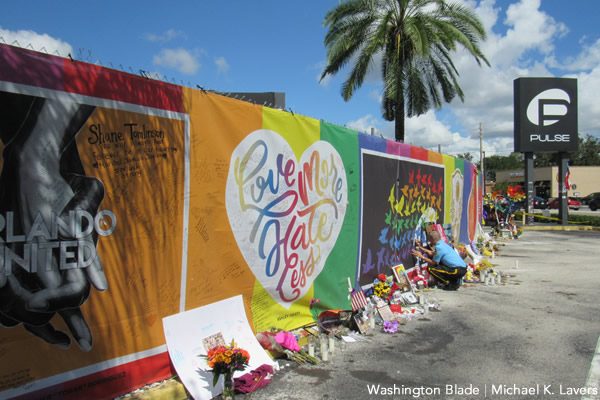
Nov. 7, 2017:
Danica Roem became the first openly transgender person elected to a state legislature in the U.S. when she defeated then-Virginia state Del. Bob Marshall (R-Prince William County), a vocal opponent of LGBT rights.
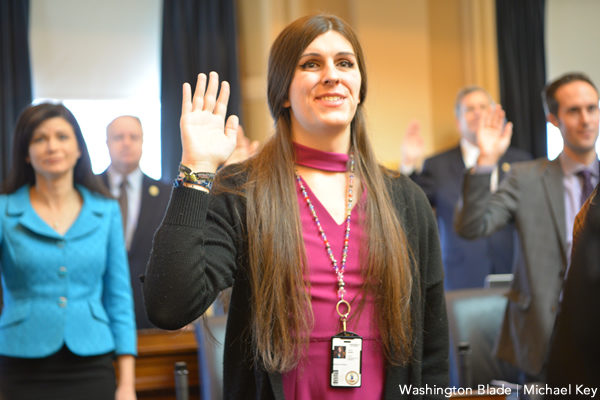
Nov. 6, 2018:
Colorado Gov. Jared Polis became the first out person elected governor of a U.S. state.
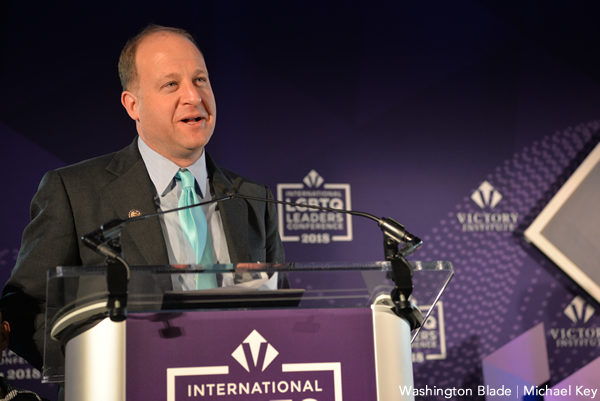
Books
Love or fear flying you’ll devour ‘Why Fly’
New book chronicles a lifetime obsession with aircraft

‘Why Fly’
By Caroline Paul
c. 2026, Bloomsbury
$27.99/256 pages
Tray table folded up.
Check. Your seat is in the upright position, the airflow above your head is just the way you like it, and you’re ready to go. The flight crew is making final preparations. The lights are off and the plane is backing up. All you need now is “Why Fly” by Caroline Paul, and buckle up.

When she was very young, Paul was “obsessed” with tales of adventure, devouring accounts written by men of their derring-do. The only female adventure-seeker she knew about then was Amelia Earhart; later, she learned of other adventuresome women, including aviatrix Bessie Coleman, and Paul was transfixed.
Time passed; Paul grew up to create a life of adventure all her own.
Then, the year her marriage started to fracture, she switched her obsession from general exploits to flight.
Specifically, Paul loves experimental aircraft, some of which, like her “trike,” can be made from a kit at home. Others, like Woodstock, her beloved yellow gyrocopter, are major purchases that operate under different FAA rules. All flying has rules, she says, even if it seems like it should be as freewheeling as the birds it mimics.
She loves the pre-flight checklist, which is pure anticipation as well as a series of safety measures; if only a relationship had the same ritual. Paul loves her hangar, as a place of comfort and for flight in all senses of the word. She enjoys thinking about historic tales of flying, going back before the Wright Brothers, and including a man who went aloft on a lawn chair via helium-filled weather balloons.
The mere idea that she can fly any time is like a gift to Paul.
She knows a lot of people are terrified of flying, but it’s near totally safe: generally, there’s a one in almost 14 million chance of perishing in a commercial airline disaster – although, to Paul’s embarrassment and her dismay, it’s possible that both the smallest planes and the grandest loves might crash.
If you’re a fan of flying, you know what to do here. If you fear it, pry your fingernails off the armrests, take a deep breath, and head to the shelves. “Why Fly” might help you change your mind.
It’s not just that author Caroline Paul enjoys being airborne, and she tells you. It’s not that she’s honest in her explanations of being in love and being aloft. It’s the meditative aura you’ll get as you’re reading this book that makes it so appealing, despite the sometimes technical information that may flummox you between the Zen-ness. It’s not overwhelming; it mixes well with the history Paul includes, biographies, the science, heartbreak, and exciting tales of adventure and risk, but it’s there. Readers and romantics who love the outdoors, can’t resist a good mountain, and crave activity won’t mind it, though, not at all.
If you own a plane – or want to – you’ll want this book, too. It’s a great waiting-at-the-airport tale, or a tuck-in-your-suitcase-for-later read. Find “Why Fly” and you’ll see that it’s an upright kind of book.
The Blade may receive commissions from qualifying purchases made via this post.
Theater
Out actor Kevin Cahoon on starring role in ‘Chez Joey’
Arena production adapted from Broadway classic ‘Pal Joey’

‘Chez Joey’
Through March 15
Arena Stage
1101 Sixth St., S.W.
Tickets start at $93
Arenastage.org
As Melvin Snyder in the new musical “Chez Joey,” out actor Kevin Cahoon plays a showbiz society columnist who goes by the name Mrs. Knickerbocker. He functions as a sort of liaison between café society and Chicago’s Black jazz scene circa 1940s. It’s a fun part replete with varied insights, music, and dance.
“Chez Joey” is adapted from the Broadway classic “Pal Joey” by Richard Rodgers and Lorenz Hart. It’s inspired by John O’Hara’s stories based on the exploits of a small-time nightclub singer published in The New Yorker.
A warm and humorous man, Cahoon loves his work. At just six, he began his career as a rodeo clown in Houston. He won the Star Search teen division at 13 singing songs like “Some People” from “Gypsy.” He studied theater at New York University and soon after graduating set to work playing sidekicks and comedic roles.
Over the years, Cahoon has played numerous queer parts in stage productions including “Hedwig and the Angry Inch,” “La Cage aux Folles,” “Rocky Horror” as well as Peanut in “Shucked,” and George the keyboardist in “The Wedding Singer,” “a sort of unicorn of its time,” says Cahoon.
Co-directed by Tony Goldwyn and the great Savion Glover, “Chez Joey” is a terrific and fun show filled with loads of talent. Its relevant new book is by Richard Lagravenese.
On a recent Monday off from work, Cahoon shared some thoughts on past and current happenings.
WASHINGTON BLADE: Is there a through line from Kevin, the six-year-old rodeo clown, to who we see now at Arena Stage?
KEVIN CAHOON: Anytime I want to land a joke in a theater piece it goes back to that rodeo clown. It doesn’t matter if it’s Arena’s intimate Kreeger Theatre or the big rodeo at the huge Houston Astrodome.
I was in the middle stadium and there was an announcer — a scene partner really. And we were doing a back and forth in hopes of getting laughs. At that young age I was trying to understand what it takes to get laughs. It’s all about timing. Every line.
BLADE: Originally, your part in “Chez Joey” Melvin was Melba who sings “Zip,” a clever woman reporter’s song. It was sort of a star feature, where they could just pop in a star in the run of “Pal Joey.”
CAHOON: That’s right. And in former versions it was played by Martha Plimpton and before her Elaine Stritch. For “Chez Joey,” we switched gender and storyline.
We attempted to do “Zip” up until two days before we had an audience at Arena. Unexpectedly they cut “Zip” and replaced it with a fun number called “I Like to Recognize the Tune,” a song more connected to the story.
BLADE: Wow. You must be a quick study.
CAHOON: Well, we’re working with a great band.
BLADE: You’ve played a lot of queer parts. Any thoughts on queer representation?
CAHOON: Oh yes, definitely. And I’ve been very lucky that I’ve had the chance to portray these characters and introduce them to the rest of the world. I feel honored.
After originating Edna, the hyena on Broadway in “The Lion King,” I left that to do “Hedwig and the Angry Inch” as standby for John Cameron Mitchell, doing one show a week for him.
Everyone thought I was crazy to leave the biggest musical of our time with a personal contract and getting paid more money that I’d ever made to get $400 a week at the downtown Jane Street Theatre in a dicey neighborhood.
At the time, I really felt like I was with cool kids. I guess I was. And I never regretted it.
BLADE: When you play new parts, do you create new backstories for the role?
CAHOON: Every single time! For Melvin, I suggested a line about chorus boys on Lakeshore Drive.
BLADE: What’s up next for Kevin Cahoon?
CAHOON: I’m about to do the New York Theatre Workshop Gala; I’ve been doing it for nine years in a row. It’s a huge job. I’ll also be producing the “Cats: The Jellicle Ball” opening on Broadway this spring; it’s a queer-centric uptown vogue ball with gay actor André de Shields reprising his role as “Old Deuteronomy.”
BLADE: There’s a huge amount of talent onstage in “Chez Joey.”
CAHOON: There is. I’m sharing a dressing room with Myles Frost who plays Joey. He won accolades for playing Michael Jackson on Broadway. We’ve become great friends. He’s a miracle to watch on stage. And Awa [Sal Secka], a D.C. local, is great. Every night the audience falls head over heels for her. When this show goes to New York, Awa will, no doubt, be a giant star.
BLADE: Do you think “Chez Joey” might be Broadway bound?
CAHOON: I have a good feeling it is. I’ve done shows out of town that have high hopes and pedigree, but don’t necessarily make it. “Chez Joey” is a small production, it’s funny, and audiences seem to love it.

The Capital Pride Alliance held the annual Pride Reveal event at The Schuyler at The Hamilton Hotel on Thursday, Feb. 26. The theme for this year’s Capital Pride was announced as: “Exist. Resist. Have the audacity!”
(Washington Blade photos by Michael Key)























-

 Federal Government5 days ago
Federal Government5 days agoTwo very different views of the State of the Union
-

 Virginia5 days ago
Virginia5 days agoVa. activists preparing campaign in support of repealing marriage amendment
-

 Opinions4 days ago
Opinions4 days agoThe global cost of Trump’s foreign aid ideology
-

 Opinions3 days ago
Opinions3 days agoCriteria for supporting a candidate in D.C.

















